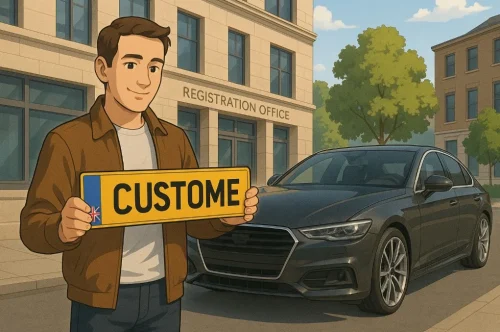Table of Contents
Understanding the value of your number plate in the UK is more than just a curiosity, it can be a valuable asset.
Whether it’s a private plate with your name, initials, or a catchy phrase, the right registration can fetch a surprising amount. Valuation depends on numerous factors like style, format, demand, and more.
With growing interest in personalised registrations, knowing what your plate is worth can help you make informed decisions about keeping, selling, or insuring it. Let’s explore how number plate value is determined in the UK.
What Is a Private or Personalised Number Plate?

A private or personalised number plate is a vehicle registration number chosen by an individual rather than assigned by the DVLA. These plates are often designed to display names, initials, words, or memorable numbers that hold personal or commercial significance.
Unlike standard plates, personalised plates stand out for their uniqueness and often serve as a symbol of identity or luxury.
In the UK, there are several styles of private plates such as dateless plates, prefix, suffix, and current style. Each comes with its own pricing tier and desirability.
Private plates do not alter the technical registration of a vehicle but offer a cosmetic upgrade that can carry prestige or even increase the value of a car. While some choose them for fun or branding, others see them as long-term investments due to their potential to increase in value over time.
Why Do Some Number Plates Cost More Than Others?
Number plates can vary in value drastically depending on multiple influencing factors. Some of the most valuable plates are those that spell out names or common words that are in high demand.
- Plates with fewer characters are typically more valuable.
- Dateless formats are considered rare and premium.
- Readability plays a major role, clear and easy-to-understand plates attract more buyers.
- Unique initials or sequences associated with high-status individuals or companies can drive prices up.
Plates linked to famous people, luxury vehicles, or historic significance also command premium pricing. For example, short plates like “F1” or “1D” have sold for six-figure sums because of their exclusivity and desirability.
Market demand also shifts values, meaning the same plate could be worth more over time depending on trends and buyer interest. Ultimately, rarity and relevance drive up the value of a private registration.
How Much is My Number Plate Worth?

The value of your number plate depends on a blend of objective and market-driven factors. A combination of rarity, desirability, and how closely your plate aligns with what buyers are actively searching for will determine its worth.
Plates that represent names, words, or initials are typically the most sought after. The shorter and more memorable your plate is, the higher the potential valuation.
Plates are assessed based on:
- Demand for the specific letters or numbers
- Clarity and style of the format
- Whether it is a dateless or suffix/prefix style
- Historical significance or ownership
To understand its real market value, a professional valuation by an experienced specialist is crucial. These dealers factor in previous sales data and buyer trends, providing a realistic estimate of what you can expect to get in today’s market.
What Influences Value: Format, Demand & Readability?
Before assigning a valuation, professionals assess three primary components—format, buyer demand, and plate readability. These directly affect market interest and pricing. Below is a table showing how each factor influences a plate’s worth.
| Factor | Description | Impact on Value |
| Format | Dateless or short prefix plates are more desirable than modern formats | High |
| Demand | Popular initials, names, or words in high public interest | High |
| Readability | Clear and easy-to-understand plates (no forced interpretations) | Moderate to High |
| Uniqueness | Rare combinations that are memorable or spell something meaningful | High |
| Length | Fewer characters typically increase value | High |
These aspects work together. A plate with a rare format and high demand, that’s easy to read, will almost always achieve a higher valuation than generic or overly complicated registrations.
Where Can You Get a Free Valuation for Your Number Plate?
If you’re curious about how much your number plate is worth, there are reliable and free ways to find out through trusted valuation services. These tools are designed to give you a fair market estimate based on multiple factors.
How to Get a Free Valuation:
- Visit a Reputable Specialist Dealer: Choose a professional plate dealer offering online valuation tools.
- Enter Your Registration Details: Use the free form provided to submit your plate number.
- Receive a Valuation: Most services deliver an instant or same-day estimate via email.
These platforms use algorithms based on:
- Market demand for similar plates
- Historical sales data
- Plate style, length, and composition
- Buyer behaviour trends
Using these tools removes guesswork and ensures your valuation reflects real-time market activity. Trusted online services assess the value using a combination of human expertise and automated databases, which is far more accurate than estimating it yourself.
Although the DVLA doesn’t offer valuations, online specialists do a reliable job of showing you how your plate performs on the current market.
Who Are the Best Dealers for Number Plate Appraisal in the UK?

Getting an accurate number plate valuation requires expertise and access to market data. Not all sources provide reliable estimates, so working with specialist dealers can make a significant difference.
These professionals combine industry knowledge with real sales insights to give realistic appraisals.
Top Qualities to Look for in a Dealer:
- Expertise in valuation: Dealers know plate formats, buyer trends, and pricing history.
- Current market insights: They use recent sales to provide relevant valuations.
- Transparent process: Clear explanations show how the value is determined.
- Manual and automated appraisals: Manual valuations consider subtle factors like word appeal or short plates.
- Future value guidance: Dealers advise on potential appreciation for informed decisions.
Working with professional dealers ensures your number plate valuation is realistic, data-driven, and tailored to market conditions. An accurate appraisal gives you confidence whether selling, buying, or investing.
What Role Do UK Market Trends Play in Plate Valuation?
Understanding market behaviour is key to identifying the true value of a number plate. Valuations aren’t static; they change based on shifting interest, economic conditions, and buyer demand.
Buyer Demand Trends
Plates linked to celebrity names, trending topics, or short words are increasingly popular. As public interest grows, so does pricing.
Seasonal Influence
Prices often spike during holidays or the launch of new car models, when people are actively registering vehicles.
Economic Outlook
In strong economies, people are more willing to invest in luxury items like private plates. Conversely, during financial downturns, values may dip temporarily.
Staying informed of what’s trending in auctions and dealer platforms helps you time your plate’s sale for maximum return. Market movement plays a larger role than most owners realise.
How Can You Sell Your Personalised Plate Once You Know Its Value?

After getting a valuation, the next step is to sell the plate effectively. You have multiple channels available, each with its own pros and cons.
Ways to Sell Your Plate:
- Specialist Dealers: They handle marketing, valuation, buyer queries, and transfers.
- Online Marketplaces: Let you list your plate independently but require more effort.
- Auctions: Great for unique or high-value plates that attract niche buyers.
Before selling, you’ll need to complete a retention or transfer process via DVLA. This ensures the plate is either moved to another vehicle or held in your name.
Essential documents include:
- The V778 or V750 certificate
- Vehicle logbook (V5C)
- Proof of identity (if required)
Timing is crucial. Selling during peak interest periods or after new plate releases can bring in more offers. Don’t rush. take time to understand your audience and choose the right channel for maximum return.
Each route offers different advantages depending on your plate’s uniqueness and market appeal.
Conclusion
Your private number plate might be worth more than you think. By understanding the factors influencing its value and using reliable valuation tools, you gain valuable insights into your asset.
From format and demand to market timing and the right selling channels, every element plays a part. Whether you’re looking to sell or simply curious, a professional valuation is the first step.
Use expert advice to make informed decisions and potentially turn your number plate into a profitable investment.
Frequently Asked Questions
What documents do I need to value or sell my number plate?
You typically need a V5C logbook and a certificate of retention or entitlement. These confirm ownership and allow legal transfer.
Can I get a valuation if my plate is not currently assigned to a vehicle?
Yes, plates held on retention certificates can be valued like any assigned registration.
Are personalised plates subject to tax or additional fees?
There are no annual taxes, but transfer and assignment fees apply through the DVLA.
How do I know if my plate is rare or in high demand?
Plates with short, clear formats or popular initials often indicate high demand and rarity.
Can business names on plates increase value?
Yes, if the name is widely recognisable or brandable, it can significantly boost resale value.
How often should I recheck my plate’s valuation?
Every 6–12 months is ideal, especially if market trends or buyer interest shifts.
What if multiple dealers give me different valuations?
Compare them to find the average, and ask dealers to justify their price points.




